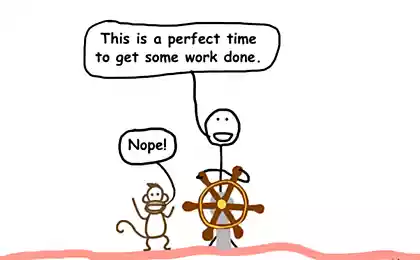318
Secrets of Overcoming Procrastination: A Scientific View and Practical Advice

Introduction. Procrastination is one of the most common problems of our time, when important things are regularly postponed. At the same time, remarkably, a variety of aspects of life are threatened: from career success and study to taking care of one’s own health. An endless “make tomorrow” cycle causes a person to feel guilty, lose motivation, and ultimately reduce overall productivity. But where does this habit of procrastination come from, and what does the science of procrastination say? In this article, we will consider the psychological and biological prerequisites, as well as present a number of practical tips that will help you find motivation and overcome the obstacle to the implementation of your plans.
Why We Procrastinate: A Science View
Contrary to popular belief, procrastination is not always associated with banal laziness. According to the American Psychological Association (APA), one of the main factors contributing to the postponement of business is the emotional state of a person – in particular, the fear of failure and anxiety before assessing our actions. In addition, the researchers found that procrastination can be a consequence of imperfect regulation of internal reward: a person chooses fleeting pleasure (watching a series, browsing social networks) instead of performing a task whose result is remote in time.
From the point of view of neuroscience, some people may have an imbalance in the work of the reward system. When we do something pleasurable, the brain releases dopamine, which supports the motivation to continue acting. However, if an upcoming task seems challenging and less rewarding immediately, the brain tends to switch to simpler and faster sources of pleasure. This process is especially intensified with high levels of stress or fatigue.
Psychological reasons for postponing cases
There are several psychological concepts that explain procrastination from different points of view. Let's look at the main ones.
1. Deferred Perfection Syndrome
People who are prone to perfectionism often want to perform the task “perfectly”, and any deviation from the imaginary standard causes them discomfort. At the same time, the process itself can seem so large and complex that the subconscious chooses to delay the start of work as much as possible. As a result, quality suffers, and time is irretrievably gone.
2. Fear of success or failure
Fear of failure (so-called atychiphobia) is a frequent companion of people who are afraid of criticism or judgment. Paradoxically, this fear can lead to “protective” behavior—a person avoids action to avoid facing possible failure. The opposite effect also works: fear of success. When an individual realizes that successfully completing a task will lead to a new level of responsibility, they may subconsciously slow their progress.
3. Low tolerance for discomfort
Some researchers have linked procrastination to increased sensitivity to discomfort and stress. If the process seems boring, tedious, or causes internal discomfort, the person tends to avoid it. This creates a vicious circle: the longer we delay a task, the more tension increases before it is completed.

How do you know if you are procrastinating?
Procrastination is easily confused with a normal rest or “reset”. However, there are characteristics:
- Regular self-persuasion: “I’ll do it tomorrow,” “I still have a lot of time,” “I’m out of shape today.”
- Avoiding priorities: A person is ready to do anything - washing dishes, rearranging furniture - so as not to take on a really important task.
- Guilt and anxiety: Constant awareness of what needs to be done, but “not now”, creates anxiety and dissatisfaction with oneself.
- Reduced time for key projects: As a result, tasks are done at the last minute, often with a deterioration in quality.
Practical tips and life hacks to combat procrastination
To overcome procrastination, it’s important to understand which factor you’re experiencing is fear, perfectionism, or lack of energy. Then you can use a set of strategies that help to develop a more effective style of behavior.
1. "Divide and conquer."
When a task seems too big, break it down into small steps. Each sub-step will give you a sense of progress and reinforce motivation. This approach uses the “quick win” effect: the brain reacts to the completion of even a small part of the task with the release of dopamine, which helps not to lose interest.
2. Setting short-term goals
Think about what gives you satisfaction in the short term. A large project does not always motivate by itself, if it takes a long time to achieve the result. Try to highlight intermediate goals, such as “write an article plan in an hour” or “picture today.” The clearer and closer the goal, the more likely you are to take action immediately.
3. Abandoning perfectionism
Perfectionism often slows down work, especially if we compare the results of our work with some ideal. Allow yourself to do “not perfect, but good enough” and then adjust and refine what you have already done. This approach reduces the fear of starting and speeds up the process.
4. The Tomato Method (Pomodoro Technique)
According to this technique, you need to work on the task strictly for 25 minutes, and then take a 5-minute break. Each tomato supports concentration and structure the workflow. Tracking the cycles of time helps the brain understand that it has only 25 minutes of effort to do, not an endless routine.
5. Create a support system
When we have a learning partner, colleague, or friend to whom we regularly report progress, there is additional motivation. Social commitment helps to avoid the imperceptible “move” into procrastination, and mutual support relieves the emotional load and makes the process more enjoyable.
6. Managing distractions
Phones, social networks, notifications are all “time thieves” that provoke an instant shift of attention. Try to create a “no distraction environment” by removing unnecessary tabs in the browser and setting a timer for limited use of social networks. Some people use website blockers to avoid being tempted.

How to maintain enthusiasm in the long run
Overcoming procrastination is not a one-time action, but a constant process of learning and self-control. Here are some tips on how to build enthusiasm for the long term.
- Develop a positive self-perception: If you think of yourself as an effective problem solver, this setup will work for you.
- Reward yourself for your achievements: Let it be a small gift or a pleasant activity that you allow yourself after completing an important part of the task.
- Learn to be mindful: The practice of meditation and breathing techniques help to better understand your emotions and “catch” moments when you want to procrastinate.
- Plan your rest: Constant fatigue is a nutrient medium for procrastination. Do not forget about the quality of sleep and regulated weekends.
How procrastination and our health are related
Research published in the Harvard Business Review indicates that chronic procrastination can lead to increased stress and, as a result, negatively affect physical well-being, from increased cortisol levels to insomnia. In addition, postponing health-related tasks (examinations, physical activity, proper nutrition) puts us at risk for long-term well-being.
On the other hand, successfully overcoming the habit of procrastinating directly affects the overall quality of life. When we begin to get to work on time, we feel a surge of energy and satisfaction from keeping our fate in control. Such internal harmony contributes to the strengthening of psychological health.
Conclusion
Procrastination does not occur from scratch – it is a complex phenomenon, which is based on psychological, biological and social factors. Being aware of your “weak spots”—whether it’s perfectionism, fear of failure, or low tolerance for boredom—helps you purposefully change habits. Specific tools come to the rescue: task breakdown, Tomato time planning, minimizing distractions, and creating an environment conducive to productivity.
The secret of success lies in constant practice. Changing a habit is a process that takes time and self-discipline. But the more you consolidate new skills to deal with procrastination, the easier it becomes to take up business and enjoy it. It is important to remember that the way to overcome procrastination is not without joy: each small victory strengthens self-confidence and teaches the brain to the idea that action, not inaction, leads to development and success. Be patient with yourself, look for a balance between work and rest – and the result will not be long in coming.























